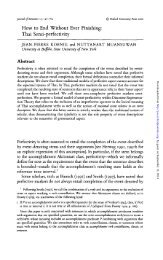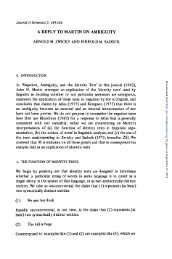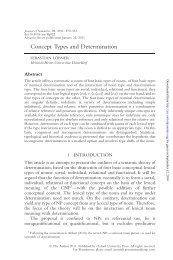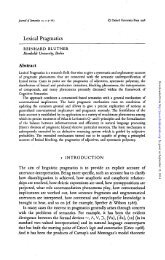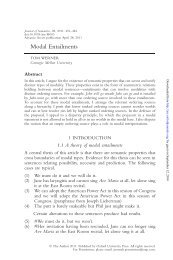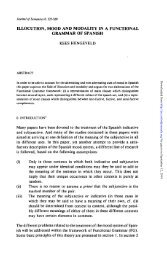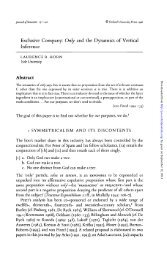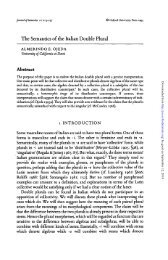Aspectual Coercion and Logical Polysemy - Journal of Semantics
Aspectual Coercion and Logical Polysemy - Journal of Semantics
Aspectual Coercion and Logical Polysemy - Journal of Semantics
Create successful ePaper yourself
Turn your PDF publications into a flip-book with our unique Google optimized e-Paper software.
138 <strong>Aspectual</strong> <strong>Coercion</strong> <strong>and</strong> <strong>Logical</strong> <strong>Polysemy</strong><br />
property would relate the different subject types in (9) The answer is in fact<br />
very similar to that for verbs such as begin. We can view these sentences as<br />
involving a metonymic reconstruction <strong>of</strong> the subject to an event <strong>and</strong>, in<br />
particular, to an experiencing event between the surface object <strong>and</strong> the surface<br />
subject. That is, in (9), it is (my reading) books which bores me, (Mary's watching)<br />
the movie which frightened her, (my seeing) John's face which scared me, <strong>and</strong><br />
(Alice's) listening to Mary which bores her. 4<br />
Thus, it seems that the linguistic evidence supports an underlying semantic<br />
type <strong>of</strong> an event as the subject, which would directly explain what the<br />
connection between the subject <strong>and</strong> object <strong>of</strong> the experiencing relation is. In<br />
Pustejovsky (1991b), it is suggested that the underlying semantics <strong>of</strong><br />
psychological predicates such as bore, anger, <strong>and</strong> frighten is a causative structure<br />
where the surface subject is the logical object <strong>of</strong> an experiencing event. On this<br />
view, the lexical representation for the verb anger has something like the<br />
following form, where Exp(x, y) is a sortally restricted relation <strong>of</strong> experiencing<br />
(e.g. hearing, seeing, watching, etc.), <strong>and</strong> < is a strict partial order <strong>of</strong> temporal<br />
precedence.<br />
(10) •VxVyVe[anger(e, y, x)] -> le^e-^Exp[Exp(e u x, y) A<br />
-angry (e v x) A angry(e 2 , x) A ->e 2 < e,j<br />
This states that a verb such as anger involves someone directly experiencing<br />
something, <strong>and</strong> as a result becomes angry. What is interesting about examples<br />
such as (9a) <strong>and</strong> (9b) is that the semantics <strong>of</strong> the NP in surface subject position<br />
contributes information to the interpretation <strong>of</strong> what kind <strong>of</strong> experiencing<br />
event is involved. That is, the qualia structure projected by the NP books<br />
contributes to the particular manner in which I became bored in (9a), namely<br />
the NP's TELIC role <strong>of</strong> reading. Similarly, our knowledge <strong>of</strong> movies as something<br />
that we watch <strong>and</strong> experience in a particular manner is encoded in the TELIC<br />
role <strong>of</strong> movie in sentence (9b). The event projected from the noun movie, viz.<br />
watch, in turn satisfies the selectional requirements <strong>of</strong> the verb anger on its<br />
subject.<br />
Adjectival selection. A third argument against coercive operations involves<br />
examples such as a long novel <strong>and</strong> a bright bulb. If adjectives such as long in this<br />
case are analyzed as event predicates, as suggested in Pustejovsky & Anick<br />
(1988), where long modifies the activity <strong>of</strong> reading a novel, then there would<br />
appear to be a problem with selection in sentences such as (9), where the verb<br />
acheter (buy) selects for an individual while long selects for an event. The<br />
question is, how can the head <strong>of</strong> the NP possibly denote both an event <strong>and</strong> an<br />
individual, since such sentences are perfectly natural<br />
(11) Jean a achete un long roman.<br />
'John bought a long novel.'<br />
Downloaded from http://jos.oxfordjournals.org/ by guest on September 12, 2014



